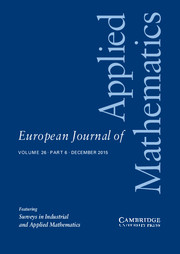Article contents
Approximate analytical solutions for a class of nonlinear stochastic differential equations
Published online by Cambridge University Press: 18 September 2018
Abstract
An approximate analytical solution is derived for a certain class of stochastic differential equations with constant diffusion, but nonlinear drift coefficients. Specifically, a closed form expression is derived for the response process transition probability density function (PDF) based on the concept of the Wiener path integral and on a Cauchy–Schwarz inequality treatment. This is done in conjunction with formulating and solving an error minimisation problem by relying on the associated Fokker–Planck equation operator. The developed technique, which requires minimal computational cost for the determination of the response process PDF, exhibits satisfactory accuracy and is capable of capturing the salient features of the PDF as demonstrated by comparisons with pertinent Monte Carlo simulation data. In addition to the mathematical merit of the approximate analytical solution, the derived PDF can be used also as a benchmark for assessing the accuracy of alternative, more computationally demanding, numerical solution techniques. Several examples are provided for assessing the reliability of the proposed approximation.
Keywords
MSC classification
Information
- Type
- Papers
- Information
- European Journal of Applied Mathematics , Volume 30 , Special Issue 5: Stochastic Analysis in Applications , October 2019 , pp. 928 - 944
- Copyright
- © Cambridge University Press 2018
References
- 4
- Cited by

